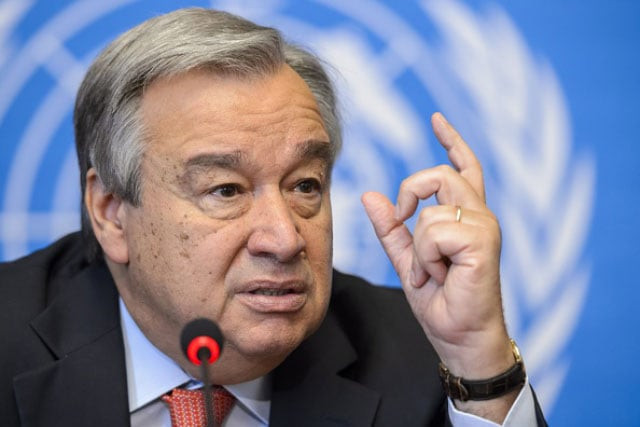Cooperate on climate or 'we will be doomed': UN chief
Guterres says climate change is an existential threat for our planet and lives

World powers must pull together and retool their economies for a green future or humanity is "doomed", UN chief Antonio Guterres has warned, telling AFP that failure to control the coronavirus pandemic illustrates the danger of disunity.
Before the virus struck, 2020 was billed as a pivotal year for the plan to dodge the bullet of catastrophic global warming, with high profile summits planned to catch a wave of public alarm over the future of the planet.
The coronavirus crisis may have shunted climate into the sidelines as nations launched unprecedented shutdowns to try to slow its spread, but Guterres said the need for climate action was more urgent than ever.
In a searing assessment of the international response, Guterres said the pandemic should sharpen governments' focus on cutting emissions, urging them to use the crisis as a springboard to launch "transformational" policies aimed at weaning societies off fossil fuels.
"I think the failure that was shown in the capacity to contain the spread of the virus -- by the fact that there was not enough international coordination in the way the virus was fought -- that failure must make countries understand that they need to change course," he told AFP.
"They need to act together in relation to the climate threat that is a much bigger threat than the threat of the pandemic in itself -- it's an existential threat for our planet and for our lives."
The UN chief said "pollution and not people" should be taxed and called for nations to end fossil fuel subsidies, launch massive investments in renewables and commit to "carbon neutrality" -- net zero emissions -- by 2050.
"We need to have a number of transformational measures in relation to energy, in relation to transportation, in relation to agriculture, in relation to industry, in relation to our own way of life, without which we would be doomed," he said.
His comments come as the landmark Paris climate deal goes into effect this year in a bid to cap the rise in temperature to "well below" two degrees Celsius (3.6 Fahrenheit) above pre-industrial levels.
The accord was already on a knife edge before the pandemic, with doubts over commitments from major polluting nations and concerns that it is still far short of what science says is needed to avert disastrous climate change.
US President Donald Trump shocked the world in 2017 when he said the United States -- history's largest emitter -- was withdrawing from the Paris deal. It is due to leave on November 4, just after the country's presidential election.
The pandemic has further dented hopes that diplomatic pressure could sweep foot-dragging nations into announcing bold climate action plans, as major summits were postponed and nations focused inwards.
Guterres said there was currently no clear sign that a United States government recovery policy would align with Paris goals, but he expressed hope that states, businesses and individuals "will compensate for the lack of political commitment that exists at the present moment".
He said much now rests on the actions of major emitters, China, the US, Europe, Russia, India and Japan, in interviews with AFP and other members of Covering Climate Now, a global collaboration of news outlets committed to increased climate coverage.
"We have never been as fragile as we are, we never needed as much humility, unity and solidarity as now," he said, blasting "irrational demonstrations of xenophobia" and the rise of nationalism.
"Either we are united, or we will be doomed," he added, ahead of a largely virtual UN General Assembly this month.


1724319076-0/Untitled-design-(5)1724319076-0-208x130.webp)
















COMMENTS
Comments are moderated and generally will be posted if they are on-topic and not abusive.
For more information, please see our Comments FAQ